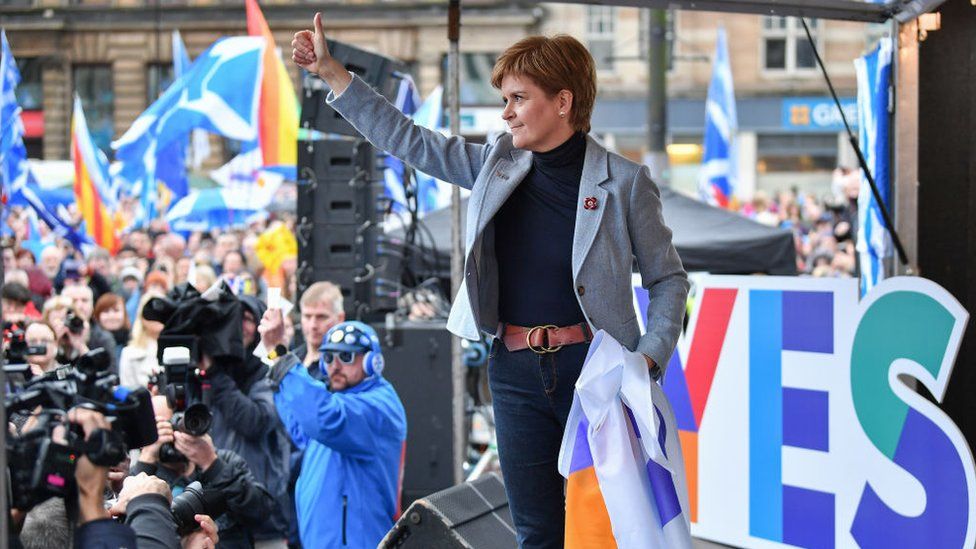Further legislation to be needed for indyref2
- Published

Further legislation would need to be tabled at Holyrood before a new referendum on independence could be held, ministers have confirmed.
The Scottish government wants to hold a new ballot in 2020 and has tabled the Referendums Bill to pave the way.
However MSPs have now been told that a further "short bill" will be needed to legislate for an independence vote.
The pro-UK parties have opposed the Referendums Bill at Holyrood, but is set to pass with SNP and Green backing.
The issue of a referendum has become a key topic of debate in the general election campaign, with the SNP putting it "at the heart" of their platform and Labour and the Conservatives disputing whether they would agree to hold one in future.
First Minister Nicola Sturgeon wants to have a new vote in the second half of 2020, and has targeted having the Referendums (Scotland) Bill in law "by the new year" as part of the preparations for this.
She has also pledged to formally request a transfer of power from Westminster - similar to the agreement prior to the 2014 referendum, which she said would put the legality of the vote "beyond any doubt" - before Christmas.
The legislation sets the general framework for any referendum, and as drafted would give ministers the power to set the date, question and campaign period of any poll later.
However after complaints that this handed too much leeway to ministers, Holyrood's constitution committee said new primary legislation should be needed for any ballot on a constitutional issue.
Constitutional Relations Secretary Mike Russell told MSPs that he was "happy to accept this", underlining that this would mean further legislation would now be needed before a new independence poll.
He said: "I agree that normally a short bill should be the way to trigger a referendum and I can confirm that any proposal for a future Scottish independence referendum should now require a short bill."
Question testing
Mr Russell also said he would reconsider the issue of whether the Electoral Commission would be allowed to test the question of any future independence referendum.
The watchdog would normally be brought in to test the question for any plebiscite, but the bill as it stands would not require this if the "yes" or "no" question used in 2014 was repeated.
Mr Russell has previously argued that there is no need to re-test questions, and Ms Sturgeon has claimed the move was part of an attempt to "rig" the referendum by her opponents.
The Commission "firmly recommend" they are allowed to test again, and Holyrood's constitution committee unanimously said ministers "must recognise the weight of evidence in favour" of this and come to an agreement with the watchdog.
On Thursday, Mr Russell offered instead to amend the bill to give previously tested questions a "shelf life" of two parliamentary terms.
However, he added: "Some of those who propose testing every question even if it has been tested before are doing so out of principle, and I respect that.
"I entirely accept that it is right for me to look at this issue again in the light of those views and the evidence that the committee has received and consider if I should go even further.
"I am therefore in agreement that I should discuss the matter with the Electoral Commission and come back at stage two with any proposal that may arise from those discussions."
Mr Russell may ultimately be forced to back down, as Scottish Green co-leader Patrick Harvie said the case for his "shelf life" proposal was "not overwhelming".
He said politicians could not choose to only trust independent watchdogs when they agree with their decisions, saying: "If there is time to conduct question testing, then I struggle to see why that testing should be dispensed with."
The legislation looks set to pass through Holyrood with support from the SNP and Greens - but all three of the unionist opposition parties said they would oppose it.
The Scottish Conservatives have pledged to oppose independence "every step of the way", and said they would vote against the "bad bill" at every stage.
Constitution spokesman Adam Tomkins said it was "vital" that the Electoral Commission is "not only permitted, but required by law" to test all referendum questions.
He said there was "no good reason" for avoiding testing, calling the move "nothing other than another ill-conceived power grab from a minister desperate for indyref2".
Labour's Alex Rowley said there was no need for a new independence vote until the "current constitutional crisis" of Brexit is resolved, saying it was "impossible to put a clear proposition to the Scottish people" at present.
He said the "flawed" Referendums Bill was "the SNP indyref2 bill" and an attempt to "rig" the vote, saying Labour could not support it on that basis.
And Lib Dem MSP Mike Rumbles said the bill was a "fraud" and a "waste of taxpayers money", and said the SNP would "face electoral consequences sooner rather than later".